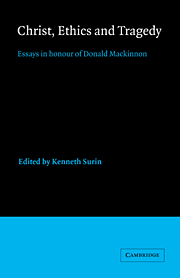Book contents
- Frontmatter
- Contents
- Preface
- Donald MacKinnon
- 1 Theological rhetoric and moral passion in the light of MacKinnon's ‘Barth’
- 2 Idealism and realism: an old controversy dissolved
- 3 Modes of representation and likeness to God
- 4 MacKinnon and the parables
- 5 Trinity and ontology
- 6 Some aspects of the ‘grammar’ of ‘incarnation’ and ‘kenosis’: reflections prompted by the writings of Donald MacKinnon
- 7 Tragedy and atonement
- 8 MacKinnon and the problem of evil
- 9 Pride and international relations
- 10 ‘Between purgation and illumination’: a critique of the theology of right
- 11 On being ‘placed’ by John Milbank: a response
- Index of names
- Index of subjects
8 - MacKinnon and the problem of evil
Published online by Cambridge University Press: 11 March 2010
- Frontmatter
- Contents
- Preface
- Donald MacKinnon
- 1 Theological rhetoric and moral passion in the light of MacKinnon's ‘Barth’
- 2 Idealism and realism: an old controversy dissolved
- 3 Modes of representation and likeness to God
- 4 MacKinnon and the parables
- 5 Trinity and ontology
- 6 Some aspects of the ‘grammar’ of ‘incarnation’ and ‘kenosis’: reflections prompted by the writings of Donald MacKinnon
- 7 Tragedy and atonement
- 8 MacKinnon and the problem of evil
- 9 Pride and international relations
- 10 ‘Between purgation and illumination’: a critique of the theology of right
- 11 On being ‘placed’ by John Milbank: a response
- Index of names
- Index of subjects
Summary
Anyone who has heard Donald MacKinnon lecture on the problem of evil, or who has read him on this subject in articles and in the Gifford Lectures, will doubtless retain a number of very powerful impressions. For on this of all the topics in the philosophy of religion with which he has been engaged throughout his teaching and writing career, the characteristic qualities of MacKinnon's thought and work have been most evident. The refusal to accept any general argument or world view that avoided confrontation with the concrete and particular, the moral indignation with purported solutions, however venerable, that smacked of superficiality or evasion, the relentless wrestling with the utterly intractable cases of both wickedness and suffering which seem at the same time to challenge and yet to demand faith in the transcendent, provided for the patient listener or reader numerous instances of both illumination and frustration that come to mind again and again as one grapples with the issues of theodicy. Many a time have I been disposed to tear up what I had written about the problem of evil, on asking myself what MacKinnon's reaction would be to the book or the essay at hand.
I have selected three recurring themes in MacKinnon's writing and lecturing on the problem of evil for discussion in this essay. The first is his intense hostility to the analysis of evil as steresis or privatio boni. The second is his insistence that there is no theoretical solution to the problem of evil. The third – related to the second – is his insistence on the ineradicability of the tragic from Christianity.
- Type
- Chapter
- Information
- Christ, Ethics and TragedyEssays in Honour of Donald MacKinnon, pp. 131 - 145Publisher: Cambridge University PressPrint publication year: 1989



